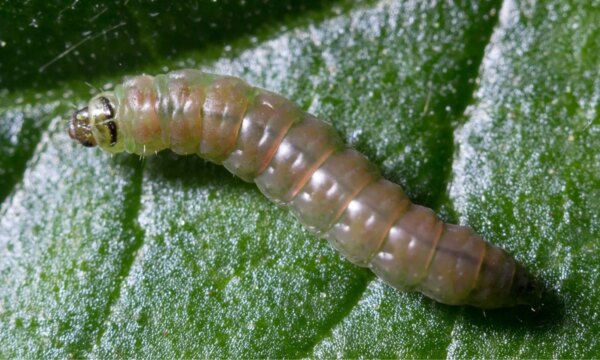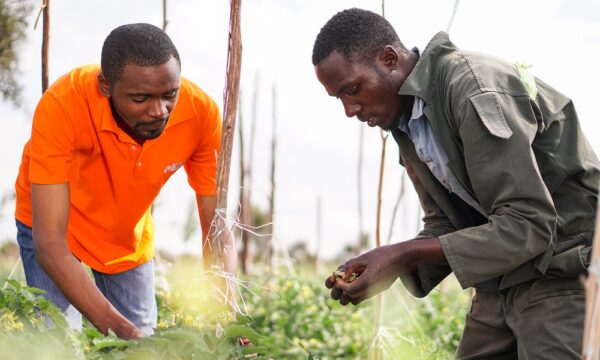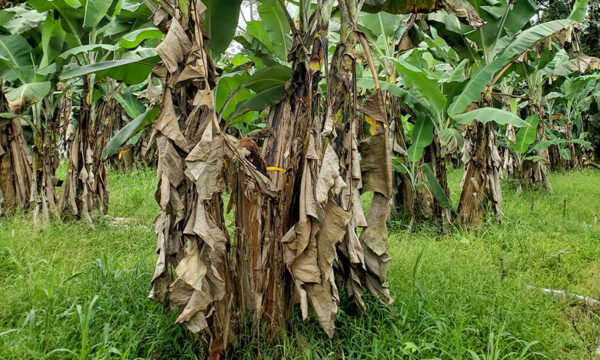 “I have suffered [crop] losses amounting to 90%. I have no other source of income apart from tomato farming. I was relying on this crop to feed my family. I have nothing to do now other than try to think of what to do next.”
“I have suffered [crop] losses amounting to 90%. I have no other source of income apart from tomato farming. I was relying on this crop to feed my family. I have nothing to do now other than try to think of what to do next.”
Elias Kamuga, Farmer, Kenya
Elias is a smallholder farmer from Kenya. Every year he sells his tomato crop at the local market, which gives him enough money to feed his family. But the arrival of a tomato pest to his region in Kenya has stopped that. The pest – a moth called a tomato leaf miner or Tuta absoluta – was recently introduced to Africa. This pest is an invasive species, and is destroying people’s livelihoods.
In 2015, Elias started to notice his tomatoes were being damaged by this pest. He tried taking them to market, but customers said they had too many holes and spots and were no good. He could not sell his produce. He believes he lost 90% of his tomato crop to the pest, and had no other source of income. Elias tried fighting this tomato pest with chemicals but they did not work. Elias now has to find another way to earn money. Thousands of farmers are in his position.
Invasive species, like Tuta absoluta, are devastating livelihoods. Tomatoes are one of the most widely cultivated crops in sub-Saharan Africa, grown in the backyards of almost every home. This important cash crop and source of nutrition is now being threatened by the recent arrival of the pest.
Tuta absoluta is rapidly moving across the African continent, decimating crops in Egypt, Ethiopia, Kenya and Tanzania. It has recently reached Nigeria, where a state of emergency has been declared – the pest has destroyed an estimated US$5.1 million of tomatoes and forced at least one major tomato processing plant to close. Growers do not know how to control it and many have abandoned tomato farming altogether. The race is on to prevent its spread with management schemes planned to limit its devastation.
Since 2014, CABI helped governments in Africa halt the Tuta absoluta threat and continues to do so. We are currently helping countries like Burundi, Kenya, Nigeria and Tanzania understand how they can best prepare prior to a pest invasion and are delivering practical knowledge on how to manage the pest once it has arrived. To address the recent severe outbreak in Kaduna State, Nigeria, we have provided the government with a technical brief on the tomato leaf miner together with available management experiences to help them develop a control strategy.
In 2015, we launched an important initiative to raise awareness of the threat of invasive species to the livelihoods of the rural poor. Our aim is to draw partners together from around the world to bring pest management solutions that exist already to the people who need them. We included Tuta absoluta as one of the priority targets for coordinated management. Our goal is to protect rural communities in developing countries from the devastating impacts of specific invasive species.
1 Comment
Leave a Reply
Related News & Blogs
Our most read blogs of 2024
As 2024 draws to a close, we’ve tallied the numbers to showcase the most popular articles on the Invasives Blog this year, along with a few favourites! This year’s most read blogs capture our collaborations with local communities and youth empowerment.…
18 December 2024

 “I have suffered [crop] losses amounting to 90%. I have no other source of income apart from tomato farming. I was relying on this crop to feed my family. I have nothing to do now other than try to think of what to do next.”
“I have suffered [crop] losses amounting to 90%. I have no other source of income apart from tomato farming. I was relying on this crop to feed my family. I have nothing to do now other than try to think of what to do next.” 



Reblogged this on The Plantwise Blog.